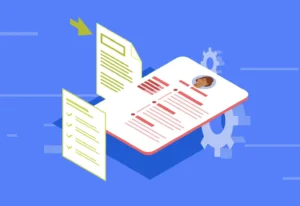Hiring managers don’t spend long on CVs. Some even scan them in less than ten seconds. So, you have just ten seconds to catch their attention and leave a good impression on them. And if your resume has lots of grammatical mistakes, you have already lost your chance to impress them.
You may be qualified, but if your CV shows poor grammar, it signals a lack of care. And in hiring, details define judgment. And every word either builds trust or erodes it.
The solution? Avoid grammar mistakes. In this blog, we will understand why and how to avoid grammar mistakes in CVs or resumes.
Let’s dive in!
Reasons to Avoid Grammar Mistakes
Poor Grammar Creates a Weak First Impression
Most recruiters make decisions quickly. If the first impression is that you are a careless person who didn’t bother checking your resume before applying, you are off the list.
Mistakes in spelling, punctuation, or verb tense tell them something about you: a lack of attention to detail. And that’s enough for them to decide against you. Therefore, you must avoid all grammar errors and ensure your CV is well-refined and error-free.
Errors Signal Weak Communication Skills
Communication cuts across every industry. Engineers, designers, and accountants all write emails, updates, or reports. A CV with grammar errors suggests that daily communication will also be messy. And that’s costly for teams who need clear handovers, instructions, and client updates.
Good grammar, on the other hand, shows you know how to keep writing sharp and precise. It’s basically a plus point that might help you get an interview call.
Inconsistency Breaks Trust
Inconsistency jumps out, even when grammar itself is correct. For instance, some write one role in the past tense, another in the present. Some bullet points start with verbs, others with nouns.
These don’t look like big errors, but they create small distractions that chip away at trust. Employers start to wonder: if you miss consistency in your CV, what happens in reports, or worse, client deliverables?
Mistakes Block Applicant Tracking Systems
Applicant Tracking Systems (ATS) serve as the initial gate for many job applications. Misspelled words or wrong grammar can mess with keyword recognition. If you accidentally write “manger” instead of “manager,” the system may skip your application entirely. That’s a silent rejection you’ll never even hear about. On the other hand, correct grammar helps ensure your CV survives that first scan.
Small Errors Undermine Big Achievements
Your CV may show leadership, technical expertise, and measurable results. But if you present them with mistakes, the impact fades. For example:
- “Lead a team of five engineers.”
- “Led a team of five engineers.”
The second feels complete and accurate. The first looks wrong, even if the experience is strong. One slip can make the reader question the rest of the content, no matter how impressive it is.
Employers See Mistakes as Habits
A CV is something you prepare over days, sometimes weeks. If errors remain, recruiters assume you either didn’t care or you don’t notice mistakes at all. That assumption extends into how they imagine you working day-to-day.
Most employers prefer candidates who spot problems before they spread. Grammar errors in a carefully prepared CV tell the opposite story: that mistakes are normal for you.
How to Avoid Grammar Mistakes
Proofread with a Process
When it comes to proofreading a resume, skimming doesn’t work. If you do so, you might miss details. Therefore, consider it as a full process:
- Read your CV once for verb tense.
- Next, check punctuation only.
- Then, look for subject-verb agreement.
And here’s a trick: read it backwards, one sentence at a time. It forces your brain to see the words, not the story. This simple shift helps you catch mistakes you would otherwise skip.
Use Clear and Simple Language
Many believe that using fancy vocabulary and complex sentences impresses recruiters. But they don’t. Instead, they prefer simple and clear language. The more complex your sentences, the higher the chances for errors. Therefore, make sure to keep your resume simple.
To analyze the difference, compare these:
- “Responsible for the comprehensive facilitation of multi-departmental communication alignment.”
- “Coordinated communication across departments.”
The second reads smoothly and leaves no room for grammatical confusion. Keeping your language simple makes proofreading easier, and your message stronger.
Use Grammar Tools
Whenever you proofread your CV, use an advanced grammar checker. It can help you fix writing errors that you might not even spot with manual checks. It’s your second pair of eyes. So, always use them.
However, for better and more reliable results, don’t use any random tool. Choose the tool that’s famous for its accuracy and context-relevant suggestions. A reliable grammar checker will be able to catch all the grammar, spelling, and even punctuation mistakes and correct them before they damage your resume.
Keep Style Consistent
Correct grammar alone isn’t enough. Your CV must flow consistently. For instance, use one spelling convention and don’t mix “organization” with “organisation.” Moreover, stick with one bullet style throughout.
Additionally, write all past roles in the past tense. Current role in the present tense.
Recruiters don’t consciously count these things, but they notice the smoothness of a consistent CV. That’s what makes the whole document feel professional.
Adapt Grammar to the Industry
An academic CV can be long and formal. A marketing CV often looks short and punchy. The grammar rules don’t change, but the rhythm does. For creative industries, shorter sentences with action verbs keep the CV lively. On the other hand, in technical roles, longer, detailed sentences may feel more natural.
Build Better Habits Beyond the CV
The safest way to avoid mistakes is to strengthen your writing habits every day. That means:
- Draft quickly, edit slowly.
- Track your most common errors and recheck them every time.
- Read high-quality material in your field.
These habits carry into all professional writing, including emails, reports, and proposals.
Over time, they make error-free writing your default, so mistakes stop creeping into your most important documents.
Conclusion
Most recruiters pay attention to the details while reviewing resumes. A CV with smooth, error-free writing conveys a professional and trustworthy image. On the other hand, even small grammar slips can weaken your first impression. Clear language keeps attention on your skills, proving you’re careful, confident, and ready for serious opportunities.
Also Read-Trawling vs. Trolling: Differences, Techniques & Impact











